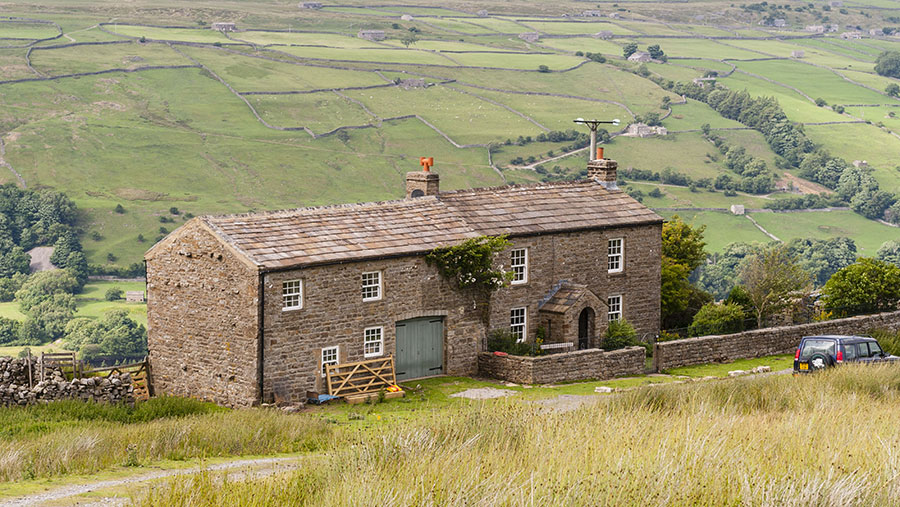Business Clinic: What are my options for vacant farm cottages?
 © Photofusion/REX/Shutterstock
© Photofusion/REX/Shutterstock Whether you have a legal, tax, insurance, management or land issue, Farmers Weekly’s Business Clinic experts can help.
Here, Jon Dearsley of Savills considers the options for vacant farm cottages.
Q A pair of farm cottages has become vacant after 40 years of occupation by former farm employees who worked for our farming partnership and I am wondering what my options now are for them?
A There are a few options available to you and your decision is likely to be made based upon whether or not income generation is your primary objective and the potential tax liabilities presented by the different options.
Holiday lets
The rise of Airbnb and the current value of sterling have led to the popularity of the ‘staycation’ and encouraged more overseas visitors to the UK.

Jon Dearsley, Food and Farming Consultant, Savills
Holiday lets can offer a 20% higher net income compared to a longer term traditional tenancy.
Often, a week’s booking in the summer brings in more than a calendar month’s rent for an assured shorthold tenancy (AST).
The trade-off, of course, is the risk of longer void periods and the ability to balance the inevitable cash flow peaks and troughs of the holidays.
See also: Business Clinic: How should I bring my sons into the farming business?
Managing the property requires commitment with organising bookings, cleaning and the need to be attentive to your guests. It may be you can resource this through family labour or you could choose to use an agency, but remember it will take quite a proportion of your income.
If you choose to run the business yourself it is worth investing in a good website and using social media to raise awareness and engage with potential customers.
Also, before you choose the holiday cottage option think about what the area has to offer. If you are in a well-known holiday hotspot with plenty of activities nearby bookings are likely to be more frequent than if your location is extremely remote and not known for its tourism.
Renting on an AST
Let property offers a consistent income stream and the AST allows a reasonable degree of flexibility. The demand for property to rent is increasing and properties equipped and furnished to a high standard will command a premium over the regional average.
The continued shortage of housing and the possibility of rising interest rates on the back of inflation means that demand for good let property is likely to remain.
There is an increasing management burden with this option. As a landlord you will be responsible for boiler servicing, carbon monoxide alarms and gas safety certificates.
Minimum energy efficiency standard legislation will take effect in less than a year and there will be a need to achieve at least an ‘E’ rated energy performance certificate before you will be permitted to advertise the property for rent.
The cottages are likely to need at least some decorating but it is important to balance modernisation and improvements against the return on investment. Research local rental markets so you don’t over spec for the amount of rent you can reasonable expect to receive.
Good kitchens and bathrooms are essential, but details including wood-burning stoves or light-coloured carpets can lift a property above the average local competition.
It is also worth considering whether or not you will allow pets, as some tenants will happily pay a premium to be able to bring their dog or cat.
Sell and re-invest – core versus non-core
This option is complex. Identifying which properties are ‘core’ and ‘non-core’ to the business or family can be difficult. There is often a presumption everything is core, but having off farm assets can be very useful when planning for succession.
Also, with ever-increasing regulation on let property and health and safety requirements, selling older residential property (with inherent liabilities) and investing in energy efficient, low maintenance property can offer better cash returns, especially with the looming energy efficiency legislation.
While many rural properties attract a capital value premium due to their setting, this doesn’t always translate into increased rental returns.
Releasing capital to invest in other aspects of the business might seem an attractive option but this must be weighed up with the tax implications.
Do you have a question for the panel?

Outline your legal, tax, finance, insurance or farm management question in no more than 350 words and Farmers Weekly will put it to a member of the panel. Please give as much information as possible.
Send your enquiry to Business Clinic, Farmers Weekly, RBI, Quadrant House, The Quadrant, Sutton, Surrey SM2 5AS.
You can also email your question to fwbusinessclinic@rbi.co.uk
